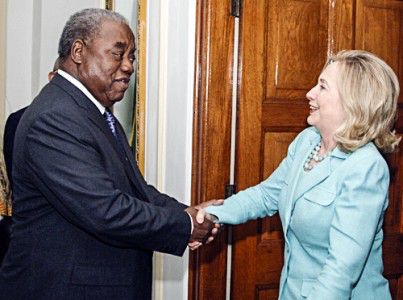
Former Zambian President Rupiah Banda will give his inaugural lecture Monday after being named president-in-residence at Boston University’s African Presidential Archives and Research Center, officials said.
Charles Stith, director of APARC, described the selection as “comprehensive but discreet.” Stith said Banda was selected so students will have access to a leader who will give them more insight into African democracy.
Banda will be the eighth African president-in-residence at Boston University’s African Presidential Archives and Research Center, according to a Tuesday press release.
In an interview with The Daily Free Press, Banda said he aims to impart any knowledge he can to students.
“I would like very much to be with the student population, to exchange views with them, to learn from them,” Banda said.
Banda, 75, was elected president of Zambia in October 2008 prior to standing in as acting president in June 2008 when President Levy Mwanawasa died. Zambia saw a 7.6 percent increase in economic growth during his presidency.
The Zambian State House reported in 2010 its economy became the fourth largest in the continent, following Tanzania, Angola and South Africa.
Banda lost the 2011 presidential elections, according to the Electoral Commission of Zambia website. Banda received 35.41 percent of the vote, while his opponent Michael Sata won with nearly 42 percent.
Banda left office after his defeat, making him one of few incumbents in the region who allowed for a peaceful transition.
“He closely lost as an incumbent [in September 2011], but he didn’t make himself remain,” Stith said. “He accepted the will of the people.”
Banda said his first lesson as president was to never become consumed by it.
“Everything that is around, everything that is done for you, you have to remember all the time that these things come to end,” he said. “I guess that’s why it was easy for me to accept it.”
While at BU, Banda is expected to provide insight into his strategies for Zambia’s economic growth, a trend Stith described as a phenomenon.
Banda said traveling across the country, listening to the people and spreading a message of unity and encouragement were vital to the economic boom.
“We have 73 different tribes across the whole country,” Banda said, “and I think one has to be deliberate in keeping them together.”
The former president said he focused on understanding the cultural differences among the various tribes and promoting the image of a united country. Another strategy involved educating the public and encouraging the youth to find future employment.
“We focused on education because we believed that was the passport to a better future, a better Zambia, to educate themselves as well as for the country,” Banda said. “Wherever we went, we would always conclude by saying ‘Take your children to school’ and so on.”
During his presidency, Banda improved infrastructure and built a number of schools and colleges for training in agriculture, Zambia’s largest industry.
“I traveled everywhere to encourage people to work hard, to take advantage of these employment opportunities and to assure them that the government cared for them and wanted to bring development as close as possible,” Banda said.
APARC intern Amrita Singh, a College of Arts and Sciences sophomore, said the African presidents BU has hosted in the past taught students about various aspects of their presidencies.
“I’ve heard that President Banda will probably be focusing a lot on economic development, but I’m sure he will be discussing a lot about Zambia and other nations and what his actual plans are,” Singh said.
Banda is expected to travel to other schools that are part of APARC’s collaborative, including Morehouse College in Atlanta and the University of Dar es Salaam in Tanzania, according to the press release.
“My expectations are just to be able to interact with [Banda],” Singh said, “and to be able to learn from everything that he’s done.”
















































































































